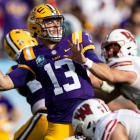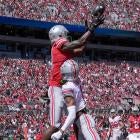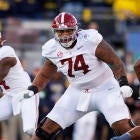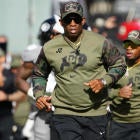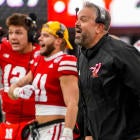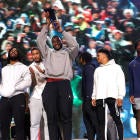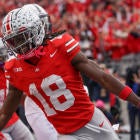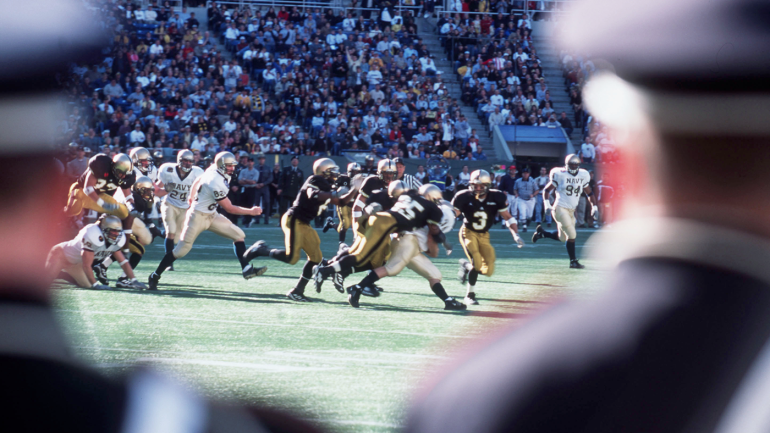
COLUMBUS, Ohio -- As the Twin Towers lay smoldering, Army football faced a not-so-simple question: Do you want to practice on the same day of one of biggest disasters in United States history?
It was up to the players, who had been watching on TV as their lives and careers got turned upside down. The planes flew into the World Trade Center just 50 miles from their campus at the United States Military Academy in West Point, New York.
This was their first big decision of a post-9/11 world.
"We were the only Division I team to practice that day," recalled former Army quarterback Chad Jenkins.
The Army-Navy Game will be played for the 122nd time Saturday at MetLife Stadium in East Rutherford, New Jersey. The games, they're all spectacles, even as Army enters this one 8-3 with Navy 3-8. But the story of this game goes beyond the field.
It's a somber anniversary. Saturday's meeting marks the 20th anniversary of the first Army-Navy Game following 9/11. The country -- the world -- was still recovering from the aftershock of the attacks.
Army won 26-17 back in 2001, but it was a game of distractions. Cadets from both sides were already girding for action at the same time they were playing football.
Barely a month after the attacks, Army seniors continued the tradition of picking the branch of service in which they wished to serve: field artillery, aviation, armor, etc. That year, Congress had to expand the limit of 125 infantrymen to 250. That's how many of Jenkins' classmates wanted to be on the ground in the fray.
"There's nothing that prepares us to go to do that in war [more] than football," Jenkins told CBS Sports as he sat for an interview recently near his Columbus, Ohio, home. "That's why football is such a catalyst."
This is a story of sacrifice and dedication and growth through the eyes of a hero, a significant participant in our country's emergence from that terrible day.
Jenkins won't like the label, but he is a shining example of why Army-Navy symbolizes what this country can be at its best. Jenkins served four deployments in Iraq. Not ready to give up service to his country, he worked for years in the FBI's counterterrorism division.
Jenkins, 42, earned three Bronze Stars symbolizing heroic, meritorious achievement.
At some point along the way, one of the strongest soldiers you'll ever meet admitted weakness. He sought counseling and was treated for post-traumatic stress disorder in 2017.
"My adult life, after combat, I never cried. I had no emotion until I went through what I went through," Jenkins said. "I consider it pure joy I'm able to have feelings again."
During the conversation, those feelings welled up.
"The Bronze Star is a sticky subject for me," Jenkins said. "I don't want to denigrate [the honors] by saying they don't mean anything because that's not true. But to me …" Jenkins paused to compose himself "… the greatest thing is bringing every man home. That's all I cared about was bringing my men home. Only the good Lord did that. The awards don't mean anything. They didn't all come home as healthy as they left, but they did make it home."
"Combat," Jenkins concluded, "it's the absolute the most unfathomable thing I think we could ever do in this world is take the lives of others. Even though if it's justified or not, it's still a horrific thing. It's been glorified way too much."
Jenkins saw death. A lot of participants in that game 20 years ago saw death. Teammates with whom Jenkins had played and others he'd competed against were killed in the War on Terror.
I was there 20 years ago in Army football's first game back, 11 days after 9/11. The Black Knights were clearly distracted that day at UAB. Some were cringing every time a jet flew over Legion Field, which was in the flight path of the Birmingham Airport.
Army lost, 55-3.
Jenkins was in that locker room of soldier-players who had that thousand-yard stare looking past the moment into the reality of combat.
The memories came flowing back to Jenkins this fall as the 20th anniversary game neared. He played with a torn PCL in that year's Army-Navy Game yet threw four interceptions in coach Todd Berry's offense. Those were the days prior to Jeff Monken's option ruling the day.
"Two of them were tipped," he reminded with a smile.
Jenkins tossed a 42-yard scoring pass before what was then the largest Army-Navy crowd in history. There was nothing that was going to stop him two weeks after the injury.
Surgery for what was thought to be a torn meniscus turned out to be a complete PCL reconstruction. The injury limited Jenkins' mobility and confidence, but as Navy approached that year, there was a bit of a conspiracy hatched with trainer Tim Kelly.
"I remember telling him that there was nothing that was going to keep me off the field that day," Jenkins said. "Tim bought into it and really sold me to the coaching staff."
The injury kept Jenkins at Army as a graduate assistant for another year while he recovered enough to get ready for infantry officer training at Fort Benning, Georgia, in January 2003.
"That's 62 days of averaging 2-3 hours of sleep and one meal a day," he said. "I went in at 175 pounds and came out at 149 pounds."
Jenkins also came out with a sense of guilt, being behind his classmates in getting to the war. Jenkins' new executive officer happened to be Chuck Schretzman, an Army alum and standout linebacker in the 1980s. Schretzman gave Jenkins a few days to go home, say goodbye and propose to his now-wife before getting shipped out to Iraq.
Jenkins and Emily Kiehorth had been together since elementary school. Jenkins actually popped the question halfway into that first year-long deployment. The couple were finally married in 2004.
"Being six months behind my classmates, that was a concern of mine because of the knee," Jenkins said. "Whether it's bravado or the essence of young men, knowing that my comrades, my brothers were in the fray … I wanted to get to the fight, as ignorant as that sounds. You don't understand what you're wishing for."
Treated for PTSD in 2017, he has adopted more Christian values. The kid that came out of Dublin, Ohio, in 1997 was entering the Army more for football than the vocation. His freshman year, 18 quarterbacks were on the roster. Jenkins fought his way to third string.
By his third year, he had become the starter. The Navy win was the only one of his career. After that 2001 game, the Midshipmen won the next 14 meetings. As the losses piled up, Jenkins was known in the battlefield and on the playing field as the last Army quarterback to beat Navy.
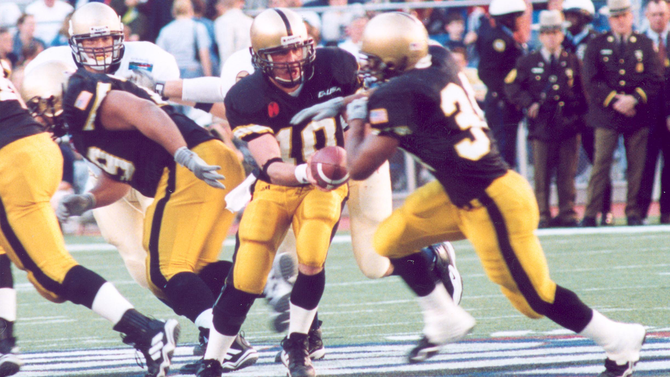
Service academy football is much more than wins and losses. It's a jumping off point to a different life. Jenkins married and had two children, but he couldn't get the Army of his blood. His time in the FBI reflected his need to keep serving and leading.
Today, Jenkins runs his own security firm.
He fondly looks back at: "The young boy I was before West Point, hungry for life, hungry to live life to the fullest. While at West Point, I learned to be a fighter."
He did that and more.
"[PTSD is] not a sign of weakness," Jenkins said. "It's not something that shows a lack of manhood. It shows the human side of how you were created -- and the psychological [side]. The brain changes when you're exposed to that many traumatic events. It goes into a heightened state because of a chemical imbalance.
"You can't stop that just like you can't stop your heart from beating."
That day 20 years ago, two teams with losing records were a symbol of our country's hope to work our way physically and mentally out of that horrible time. They were our first line of defense that happened to be playing football. They were treated that way. President George W. Bush spoke to the team.
"He was saying the words, but he had Ranger Regiments already deployed overseas," Jenkins said. "He had already jumped into Afghanistan conducting combat operations."
In other words, the game was the secondary.
General Norman Schwarzkopf, commander of the United States Central Command and an infantryman himself, also addressed the team.
"Men, the Army does not lose wars," he said.
The entire process -- from Army prep school to the battlefield -- is about prioritizing decisions. In the intense study environment of the academy, football was a relief. That paper due the next paled in comparison to being able to hit a teammate or opponent.
In the intense live-or-die battlefield scenario, those decisions must be made split seconds apart. So, it's understandable what happened that day of the attacks when Army decided to practice.
"It was probably the most violent and the most adrenal-filled practice we had," Jenkins recalled. "We had skirmishes and fights. It was just a melee all over the field. To know at that specific time that we had been attacked. We were now a nation at war. Now, you have young men on a football field, which is the closest thing to war.
"I know that cliché gets thrown out there. Some get deterred by it. But, hey, I've been on both fields. I've been on the field of battle. I've been on a football field. There's nothing that prepares men more for combat than playing Division I college football."













